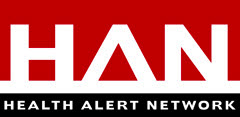
Friday, November 06, 2009, 13:51 EST (01:51 PM EST)
CDCHAN-00300-2009-11-06-ADV-N
Key
Issues for Clinicians Concerning Antiviral Treatments for 2009 H1N1
Situation:
Although use of influenza antiviral drugs in the
It is critical to remember that it is not too late to treat,
even if symptoms began more than 48 hours ago. Although antiviral treatment is most effective when begun
within 48 hours of influenza illness onset, studies have shown that
hospitalized patients still benefit when treatment with oseltamivir is
started more than 48 hours after illness onset. Outpatients, particularly those with risk
factors for severe illness who are not improving, might also benefit from
treatment initiated more than 48 hours after illness onset.
Recommendations for
Clinicians:
Many 2009 H1N1 patients can benefit from antiviral treatment, and all hospitalized patients with suspected or confirmed 2009
H1N1 should receive antiviral treatment with a neuraminidase
inhibitor - either oseltamivir or zanamivir - as early as possible after illness onset. Moderately ill patients, especially those with risk
factors for severe illness, and those who appear to be getting worse, can also benefit from treatment with neuraminidase inhibitors.
A full listing of risk factors for severe influenza
is available at: http://www.cdc.gov/h1n1flu/highrisk.htm.
Although antiviral
medications are recommended for treatment of 2009 H1N1 in patients
with risk factors for severe disease, some people without risk factors may also benefit from antivirals.
To date, 40% of children and 20% of adults hospitalized with complications of 2009
H1N1 did not have risk factors. Clinical judgment is always an essential
part of treatment decisions.
When treatment of persons with
suspected 2009 H1N1 influenza is indicated, it should be started empirically.
If a decision is made to test for influenza, treatment should not be
delayed while waiting for laboratory confirmation. The earlier antiviral
treatment is given, the more effective it is for the patient. Also, rapid
influenza tests often can give false negative results. If you suspect flu and
feel antiviral treatment is warranted, treat even if the results of a rapid
test are negative. Obtaining more
accurate testing results can take more than one day, so treatment should not be
delayed while waiting for these test results.
For more information on influenza testing, please see: http://www.cdc.gov/h1n1flu/guidance/diagnostic_tests.htm.
Although commercially produced pediatric oseltamivir suspension is in short supply, there are ample supplies of children's oseltamivir capsules, which can
be mixed with syrup at home. In
addition, pharmacies can compound adult oseltamivir capsules
into a suspension for treatment of ill infants and children. Additional information on
compounding can be found at: http://www.cdc.gov/H1N1flu/pharmacist/.
For More Information
Updated
Interim Recommendations for the Use of Antiviral Medications in the Treatment
and Prevention of Influenza for the 2009-2010 Season: http://www.cdc.gov/H1N1flu/recommendations.htm
Questions
& Answers:
Antiviral Drugs, 2009-2010 Flu Season: http://www.cdc.gov/h1n1flu/antiviral.htm
Influenza
Diagnostic Testing: http://www.cdc.gov/h1n1flu/diagnostic_testing_clinicians_qa.htm
Updated Interim Recommendations for Obstetric
Health Care Providers Related to Use of Antiviral Medications in the Treatment
and Prevention of Influenza for the 2009-2010 Season: http://www.cdc.gov/H1N1flu/pregnancy/antiviral_messages.htm
Antiviral
Drugs: Summary of Side Effects: http://www.cdc.gov/flu/protect/antiviral/sideeffects.htm
General information for the public on
antiviral drugs is available in 2009 H1N1 and Seasonal Flu: What You Should
Know About
Flu Antiviral Drugs at http://www.cdc.gov/H1N1flu/antivirals/geninfo.htm.
Downloadable brochures and informational
flyers, including one on antiviral drugs, are available at http://www.cdc.gov/h1n1flu/flyers.htm.
For the FDA page on antiviral influenza
drugs:
http://www.fda.gov/Drugs/DrugSafety/InformationbyDrugClass/ucm100228.htm
For
additional information, you can also call CDC's toll-free hotline, 800-CDC-INFO
(800-232-4636) TTY: (888) 232-6348, which is available 24 hours a day, every
day.
HAN Message Types
- Health Alert: Conveys the highest level of importance; warrants immediate action or attention. Example: HAN00001
- Health Advisory: Provides important information for a specific incident or situation; may not require immediate action. Example: HAN00316
- Health Update: Provides updated information regarding an incident or situation; unlikely to require immediate action. Example: HAN00309
- Info Service: Provides general information that is not necessarily considered to be of an emergent nature. Example: HAN00319
## This Message was distributed to State and Local Health Officers, Public Information Officers, Epidemiologists and HAN Coordinators as well as Clinician organizations ##
You have received this message based upon the information contained within our emergency notification database. If you have a different or additional e-mail or fax address that you would like us to use, please contact your State-based Health Alert Network program at your State or local health department.
- Content source: CDC Emergency Risk Communication Branch (ERCB), Division of Emergency Operations (DEO), Office of Public Health Preparedness and Response (OPHPR)
Get email updates
To receive email updates about this page, enter your email address:
Contact Us:
- Centers for Disease Control and Prevention
1600 Clifton Rd
Atlanta, GA 30333 - 800-CDC-INFO
(800-232-4636)
TTY: (888) 232-6348 - Contact CDC-INFO


